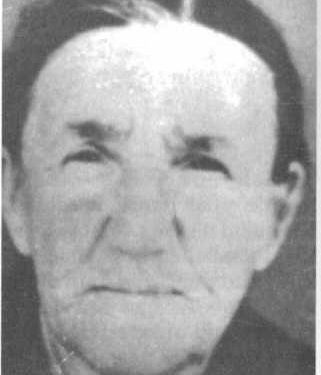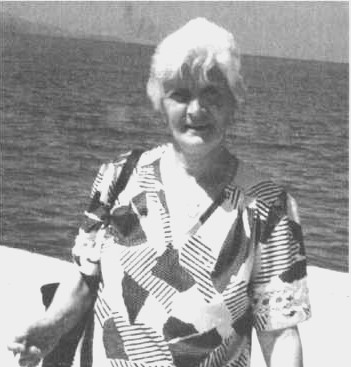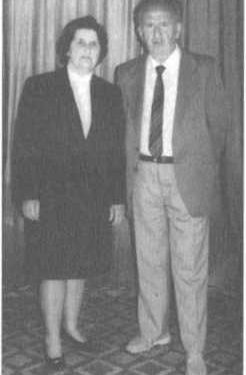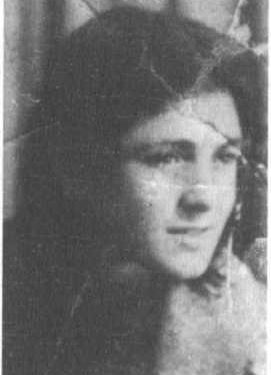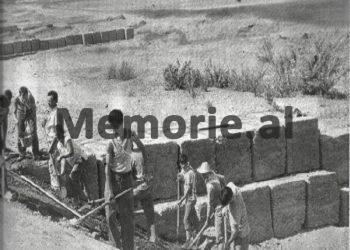By Sofika Prifti Cara
Part nine
To forgive…!
– Old Kavajas Tribe – CARA
Memorie.al/ publishes excerpts from the book ‘Të falësh’ (To Forgive), authored by Mrs. Sofika Prifti (Cara), a publication of the Institute for the Study of Crimes and Consequences of Communism in Tirana, in which the author has meticulously and professionally described the history of one of the most prominent clans, not only in the city of Kavaja but also beyond, the Cara clan. From this clan emerged not only distinguished patriots and national figures who contributed to the national cause and the freedom of Albania, but also notable intellectuals, graduates of Western universities, who later returned home, contributing to various fields of science and life. However, even though the descendants of the Cara clan dedicated their lives to the national cause, after the communists came to power at the end of 1944, they would be persecuted, imprisoned, and interned, and the fierce class struggle would pursue them until 1990, when the collapse of the communist regime began.”
Continued from the previous issue
ARRESTING THE BROTHER-IN-LAW
“Five years had passed since Bardhi’s arrest! I thought the communist state had forgotten me, but no! The knocking at our door returned. It was louder this time than the first knocking! The same people who had arrested and sentenced Bardhi came again: the operative Basri Basha, the chairman of the neighborhood People’s Council, Fejzi Hoxha, a council member, and two police officers! This time they had targeted Bardhi’s brother, Sabri Cara.
They accused him of “agitation and propaganda,” which was the “migraine” or the most preferred diagnosis for sentencing a portion of the people they had placed on their lists. Here is what Sabriu was accused of: “He had not listened to the party congress held in ’70-’71”! In fact, he had watched and listened to that congress on the enterprise’s television, with the collective. Compulsory listening had been organized by the enterprise for everyone!
My brother-in-law worked as a tire repairman in the vehicle park. He was a master tire mechanic. He went to work with dignity and was very neat in his dress. He had said somewhere, “there is no cheese and milk,” but everyone knew what was missing at that time! This fabrication sentenced Sabriu to eight years in prison, a sentence he served in Spaç of Mirdita. He was there during the time of the revolts. The worst part was that the Security people fabricated non-existent words, terrible inventions.
Thus, to sow discord among the people of the house, despite all the troubles we had, they would tell us: “We have the information from the people of the house…”! This was one of the hundreds of thousands of maneuvers that system used to introduce conflict and division into families, with the most elaborate lies. Sabriu was a good man, self-denying, and did not associate with anyone. After his brother, Bardhi, was sentenced to 15 years in prison, his path was home-work and vice versa, because that regime completely nailed him down.
When Bardhi was arrested, he was initially angry with his brother and used to say: “He got us into trouble! What did he do to us! They don’t sentence anyone for nothing!” He blamed Bardhi, never went to meet him, because he was extraordinarily afraid. He wouldn’t even look at our children. However, when he was arrested five years after his brother, for no reason at all, he then understood that their family had been placed in the red circle, to be liquidated.
Sabriu left his wife, Tefta, at home, along with three small children: Elizabeta, Ariani, and Valbona. Tefta and I were like two of the best sisters; we were inseparable. Wherever we went, we were together; everything we did, we did together, even needlework. I would not trade Tefta for anything. I loved her very much.
INTERNMENT
Two years passed since Sabriu’s sentence and seven years since Bardhi’s sentence. After this great storm, another storm arrived for us: the day of the forced expulsion of our families came! One Sunday, at the beginning of 1974, at eight in the morning, we were notified of an urgent meeting in the courtyard of the neighborhood Council. The meeting was about “undesirable people” and “class struggle”! We were told not to be absent or late.
The meeting started quickly! Many people had been gathered. At first, they spoke about the good things the party was doing – “but alas, in the bosom of the party,” the party man said with cynicism, “there are people who do not deserve it and must be shown their place.” This is how the representative of the Party Committee opened the discussion, and after him, the delegate from the Internal Affairs Branch took the floor. After he also spoke “about the great work the party does, for the good of the people,” (!?) he added in a savage tone:
“…Even here in your neighborhood, there are people who do not love our party, and for them, we have taken measures to remove them from the neighborhood, as undesirable families. In this meeting, you yourselves proposed the internment of the Cara families, (no one from the neighborhood spoke at the meeting!) you spoke yourselves, and you sealed the deal yourselves!
Before the meeting was even over, at ten in the morning, we saw three cars lined up with four armed police officers each, in front of our houses. They told us: “Go home quickly,” while the meeting continued. But, as soon as we arrived home, they handed us the internment notice, for 5 years, and told us with arrogance: “Pack your belongings, quickly; you will leave the houses empty, sign here!”
The internment for us was designated in three different villages: Gjegjan, Mbërrs, and Vloshtë, which were in the mountains of Kurjan village in Roskovec. We were three women, with seven small children; the husbands who were home had gone to Vlora that day. The younger sister-in-law, Burbuqja, had been telling us for two days: “I have a bad premonition; I don’t know what will happen to us!”
Those days, she felt a lump that had caught her throat; she could barely breathe, she felt faint, and dreams wouldn’t let her sleep. That Sunday, she had gotten up early, at four in the morning, had lit a fire outside with dry kindling, and had put the cauldron on to wash clothes. Just as she was about to start washing, she thought she heard her youngest daughter crying. She went to quiet her and put her back to sleep, but what did she see!
A spark had fallen on the dry clothes; they had caught fire and were all burned! So we were left without changes of clothes, as our clothes were few. She came to us crying and told us everything. We told her: “There, the nightmare you had come true! It’s over now. May the evil go there?” “No, no, it’s tightening more,” she trembled, “I don’t know what will happen to me!” When we were returning from the internment meeting, she told us: “See? That was the nightmare that caught my throat!”
We started, with tears in our eyes, to gather the belongings, loaded them into the cars, and left for somewhere! We didn’t know where they would banish us! The journey was long, three and a half hours by car, and where we went, the houses we had were cow sheds, uncleaned, because they had built new stables for the cows. We were on the top of the mountain, without drinking water. We had to go down the mountain, where there was a spring; all the houses on that mountainside drew water there.
In summer, the spring reduced its water, and it flowed thinly, like a thread. The queue was long. In summer, a small stream flowed below, which had little water, where we sometimes went and washed clothes. In winter, the stream was torrential, and during the summer, you couldn’t bathe on the top of the mountain, so not only our heads but also our bodies were filled with parasites! O God, only you were a witness to those times and the difficult sufferings we endured there!
In winter it was different; we were near the Shpirag Mountain, it snowed and rained heavily, and we collected water in containers from leaks. Tefta, Sabriu’s wife, my sister-in-law, had previously worked with tobacco, and in summer, she worked in construction. One day, while working there, a beam had fallen on her head, splitting her head open. She escaped death by a hair’s breadth then! She was admitted to the hospital; when she was discharged, she took a few days off and a report for light work, without lifting weights and without sun, but, surprisingly, when she returned to work, they sent her back to where she was injured, in construction!
So she came to internment with a cracked head, not fully healed. Our work there was agriculture. She had to feed the three children alone, because Sabriu was in prison. Elizabeta, Ariani, and Valbona, although small, tried to help their mother. Sabriu, after serving eight years of his sentence, was released from prison. They sent him to the village, even though he was not on the internment list and the five years they had signed on the internment paper had ended.
Besniku, the other brother-in-law, who was married to Burbuqja, when he returned from Vlora, they also banished him there! His family grew and thus became ten children! Naturally, the poverty was also greater. The internment was set for five years on paper, but it continued until 1991, and their houses had been forcibly emptied.
To Sabriu’s house, they had brought Andon Çuko, a forestry technician, who came from Kolëkondasi, a village far from Libofsha in Fier. To Besnik’s house, they had brought the cook of the reception house, Nasta Mone, from Qenas village in Fier. Her husband worked in the military. The house was new, freshly finished, in the middle of a large garden, with a well, filled with various trees, such as oranges, lemons, tangerines, persimmons, pears, apples, medlars, plums, grapes, and figs.
She paid 50 old lek rent per month, she sold the garden’s fruits, and the rent was paid by the fruits. The brother-in-law could only move with permission from the all-powerful person of the area. He was forbidden to approach his house, which he had built with his fingernails, with many sacrifices. This was not enough. That woman became greedy and later wanted to privatize it through the state, saying everywhere: “This house belongs to me, I have been living here for many years, they will never return from internment! These houses belong to the state, now this house is mine!”
They had planted nearly two dynyms (approx. 2000 sq. meters) of land with various trees, until those trees grew, and they claimed the well water, which was very good. Our two-story house was taken by the state and turned into a nursery, as there was not much land around. Earlier they had put renters there, but they were given other houses, and ours was turned into a nursery! The director of the nursery asked the committee for our garden, to include it within the building. They took our garden too, and gave it to the nursery.
It was a very beautiful garden. The director, as if she were the owner there, started cutting the trees, and some that remained dried up, because the women who worked in the laundry threw coal ash into the garden. (This type of coal was used at that time.) To this day, apart from the two-story house, which was forcibly taken back in the years ’91 -’92, by removing the nursery’s belongings, we have not received a single palm of land, from our 16 dynyms! Most of this land was divided by the state for houses, 200 sq. meters each (a small amount for private land!) One of those who benefited this way was Naum Konomi.
This man received 300 square meters of land from the state, but he also occupied some more little by little, and then he gave it to an Arab company, which built a ten-story building there, benefiting himself with four entrances and a shop!! Naumi had come from Kërkutasi, (a village far from Libofsha in Fier.) When we held the trials for the land, they called him too.
When asked, he said: “We know that this land belongs to Musa Cara, let’s be honest about this. The state gave me this land to build a house, with papers. These boys have the right to seek compensation, according to the law. I am conscientious!” Bardhi’s land was cut up for houses, a mosque was built there, but when the new mosque was built, the imams appropriated the land for themselves!!
Later, the neighborhood council was established there, then it was given for housing, and those who were inside privatized it. And we have the right to ask loudly: “Where is the state that issues laws and does not enforce them”?! The law is that the building erected on private property belongs to the owner. The first buyer is the owner of the land. But we have received nothing to this day!
THE CUTTING OF THE FINGERS
I will never forget the day when Xhevdeti, my brother-in-law, cut off four fingers at work! The poor man worked as a laborer in loading and unloading at the food enterprise. They were unloading barrels of solar (heating oil/diesel), which had arrived at that enterprise. During unloading, his colleague’s barrel slipped; Xhevdet skillfully caught it with his body, but could not save the fingers of his right hand, which were crushed by the barrel and severed all four.
If the barrel had fallen and spilled, it would have had other, more serious consequences. Xhevdet was protecting against everything, because, as was known, they would blame him, even though he was not at fault at all! O God! After he was discharged from the hospital, they gave him ten days off and a report for light work. How many sleepless nights, how much pain! He was released from the hospital and stayed for a few days. The poor man would go out and walk the streets, with his hand raised, grasping that hand with the severed fingers with the other hand, and I would stretch on my tiptoes to reach his raised hand and blow on it with all my soul, feeling as if I was easing his pain.
His hand was left with one finger and a quarter! When the leave ended, they assigned him to “light work” – tying sacks! Apparently, they “forgot” that one hand had only one finger! How was he supposed to tie the sacks? The wound was not fully closed; the bandages were soaked with blood. Then Xhevdet went to the enterprise doctor, who gave him time off again, but his hand had become infected and was swelling.
The enterprise doctor told him: “Xhevdet, I am only allowed to go this far. I will give you a recommendation for the superior commission, to extend the leave!” On the day of the superior commission, we both went to Tirana, with an envelope containing the medical documents and his file. The chairman of the commission was Ylli Popa. Xhevdet went in and gave him the envelope with the documents from Fier; he opened it, read it silently, looked at my brother-in-law’s fingers, and said:
“Fier gave you the leave that was due and sent you to light work.”
“No,” said Xhevdet, “they gave me little, only what was due to them, that’s why they brought me here, because they think I need more time off. The light work they gave me there is tying sacks with one finger. Can I tie sacks with this hand?”
“Good young man,” the chief doctor spoke in an official tone, “where they tell you to go, you will go!”
Xhevdet came back to work there. The sacks he tied opened quickly and spilled. That 15-day period, he did not sign the payroll at all! He took another 15 days off, without the right to a salary. After 15 days, he returned to work. But his hand was very swollen. The nurse who treated him told him one day:
“Xhevdet, you lost your fingers! If you continue with this job, you will lose your hand too. Go claim your rights, because you will suffer badly!”
“But where should I go?” he said.
We were sent to Tirana again, according to the rules. The strongest part was that the chairman of the superior commission, Ylli Popa, told him:
“You yourself aggravated the wound, which became infected, in order to get a report, because it’s not possible for the hand to become like this!”
“You infected this hand,” I said angrily, “because he took 15 days off without the right to a salary.” But Xhevdet was a proud man. He made some clarifications with those on the commission, and then told Ylli Popa:
“Doctor, please, doesn’t look askance at people in trouble, but give them what they deserve! I don’t want your report; just write what you see about my fingers in the file.”
We went outside and came to Fier, without taking the file. The next day, my brother-in-law reported to the enterprise and took one month off, without the right to a salary. Thus, the time off lasted six months, until the wounds on his fingers closed. After a week, the file arrived from Tirana: they had given him three months off, and he was supposed to present himself in Tirana again. When the enterprise nurse saw it, she said:
“Xhevdet, why didn’t you come to get the report? Did they bring it from the commission?!” “Forget it,” Xhevdet said sadly, “because the chairman of the commission told me that I had aggravated the wounds myself. I left completely; I told him I don’t want your time off.”
At the enterprise, they called him to the directorate and thanked him, (we know how you are, what troubles you have, you saved the enterprise for us, and I told you so.) Xhevdet did a lot for our children. Bardhi had entrusted them to him, and he kept his word. He even gave the children the last bite of bread.
With Ija (my mother-in-law) and Xhevdet, where haven’t I roamed – prisons in Fier, Tirana, Ballsh, Skrovotina, Burrel, and Ballsh! How many lunches and dinners we missed, and we had long forgotten breakfast! Often our cheap food was wild greens, which we cooked, sometimes with oil, sometimes without oil, and with a little flour! When the end of the salary came, we were in a very bad state, and I would go to work with only a slice of bread.
When lunch was eaten at 12, I would distance myself from my colleagues. But they would joke: “Sofi, come and eat with us, or do you have something good and want to eat it alone?!” (They knew well that I had no money.) They felt sorry for me. “She has no bread to eat,” they would say. But I would answer that I had eaten a lot in the morning and my stomach was heavy! I would take the slice of bread out of my bag and show it to them: “Here’s my bread.”
That slice of bread would go to work and come home, for three consecutive days, until it developed a white layer like mold, but I wouldn’t throw it away: I would heat water with a little sugar, soften the moldy bread, and eat it. When the salary was taken, we ate the list foods for a few days, but with that little money, we could only eat for one week, then we had to save a lot, even Xhevdet, who was a man. Due to poverty, and eating badly, my brother-in-law developed anemia. He had lost a lot of blood with the severed fingers and could never replace it. We were in a very bad state!
CHANGING HOUSES
In 1977 or ’78, an earthquake struck the Fier area and damaged our house: they moved me to an entrance with one room and a kitchen, for two families together. Milika Agaraj had the kitchen and annex, while I had the room and balcony, with the living room and bathroom shared. Milika was divorced and had a daughter aged 7-8. We lived together for nine years, and only we know how we managed to live like that. She got married several times. She was young! I don’t remember her ever cleaning the living room or the bathroom, because she wanted to annoy me so I would leave and she could keep the entrance.
I really couldn’t stand her for a minute. But where was I to go, poor me?! The worst part was that she would denounce me repeatedly to the all-powerful person of the neighborhood, or to the Branch: “She does not have Comrade Enver’s photograph in the house, because her husband, who was in prison for 15 years, does not want it, she watches television on foreign stations,” (at that time, only the Tirana station was watched,) and other slanders. She herself did not have a television, but she heard foreign voices and did not know that Tirana was broadcasting those films with translation!
Bardhi was released from prison in 1982, but wherever she saw him, she would annoy him, shouting: “Oh enemy, oh convict, your place is in prison,” and many other words. Bardhi would not say a word back, because that’s what she wanted, to catch him in a verbal fight and have him sentenced again. She was a woman who was completely unreasonable, neither in the family nor at work. At the wool processing enterprise where she worked, she had problems; she didn’t get along with the neighbors either, no one would speak to her, as everyone knew her well.
Living in an entrance with Milika for nine years was like having a scorpion that was stinging my body and waiting for the moment to poison me. I often went to the neighborhood and the committee, asking for a house, but my wish was only fulfilled in 1987: finally, I got a room and a kitchen!
Afterward, I was amazed at how I had spent nine years with Milika! After a few years, in 2005, I was in Fier, at the market, when I noticed someone watching me intently. It was Milika. She approached me and, without any remorse for what she had done to me, said: “Sofika, forgive me, I have wronged you greatly. You were so kind, you advised me like a mother, you endured me, and if I had listened to you from the beginning, I would be a different person.
I repaid the kindness you showed me very badly, forgive me! Those were difficult times, that system corrupted us, my father was an officer, he didn’t teach me well, in short, I wanted you to get annoyed so you would leave and I could keep the entrance. May that time never return! Here I am, kill me if you want, just forgive me!” Even today, I don’t know if that woman spoke to me with sincerity or hypocrisy.
When the time of democracy came, surprisingly, she came to Kavaja, found my house, and was calling me from downstairs, below the apartment building. To tell the truth, my blood rushed to my head, who knows how high my blood pressure went, my face had turned red like a poppy. At that moment, I remembered all those scenes of suffering that that woman had caused me, the crazy slanders to the all-powerful person of the Branch and in the neighborhood. I am the type who cannot kill a bird, but when I thought of Milika, who had come, I wanted to go down and tear her to pieces.
With her, it was as if I had lived in a real hell! Hatred consumed every cell of my body. Then I sent the neighbor to chase her away, and she told her with contempt: “Go, disappear, and don’t show your face again, because she can’t look at you, her eyes hurt!” And she left like a dog, with her tail between her legs. Perhaps she truly repented, but what was the importance when things had passed? Milika belonged to a time I wanted to erase from memory forever. Memorie.al




